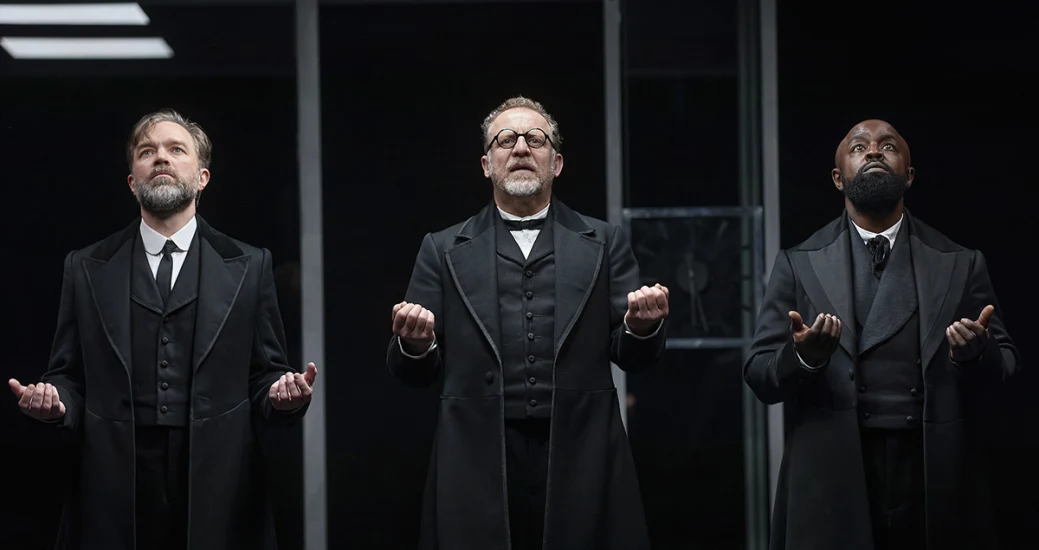'The Lehman Trilogy' review — epic play continues to astonish with new cast
Read our four-star review of Hadley Fraser in The Lehman Trilogy, now playing at the Gillian Lynne Theatre through 20 May.
The fifth time furthers the charmed life of The Lehman Trilogy, the mightily moving play that premiered at the National Theatre in July 2018. The show has since twice crossed the Atlantic, winning five Tony Awards last June on the occasion of its Broadway premiere.
And here it is back in the West End for a first showing since the pandemic, equipped with a new cast that lands the play differently from the astonishing trio I saw twice before, but with a cumulative power that acquires a weight all its own.
A tale of both the tenacious grasp and collapse of capitalism refracted across 164 turbulent years, Ben Power’s remarkable compression of Stefano Massini’s five-hour original continues to astonish on a third viewing. And, truly, no praise is too high for Sam Mendes’s production and an assemblage of design creatives that reveals Es Devlin’s sets, Jon Clark’s lighting, and Luke Halls’s video work as star turns all their own. My companion for the play, a newcomer to the show, gasped in wonder at the start, and the dazzle is sustained across 3.5 hours even as the terrain traversed by the show grows ever darker.
I confess to feeling vaguely proprietary about a first cast that united Simon Russell Beale, Ben Miles, and Adam Godley in a sort of symbiotic commitment to storytelling that had much to do with their roles in helping shape a sprawling, diffuse text into a complete theatrical experience, not merely a beautifully appointed history lesson.
But though aspects of those originators’ protean star turns go unequaled here, the engaging trio of Nigel Lindsay, Michael Balogun, and Hadley Fraser locate an underlying fury to the narrative leading to Lehman Brothers’ 2008 collapse that feels appropriate to the apocalypse described. You watch an initially enchanting America come to all but engorge its citizenry, as the story moves from one of dynastic renewal to a day of reckoning within the banking community whose fallout is felt still: The resulting detritus provides a visual frame to a propulsive narrative that manages to be both intimate and epic at once.
We first see Lindsay’s Henry Lehman newly arrive in wonder on American shores. Before long he is making his way in the cotton industry in Alabama, well before the items sold, traded, and speculated upon shift to coffee and, of course, toward cold hard cash in all its heady glory.
Balogun plays the volatile middle brother Emanuel (born Mendel), with Fraser as Mayer Lehman, the youngest brother, who is less sweetly goofy than was the inimitable Godley.
I doubt anyone will do the twist, near the end, with quite the sublimely silly grace achieved by Godley, though the earthier Fraser takes his own joy in the shape-shifting required: I smiled at the sight of him as a demure Pauline Sondheim, wife of Emanuel, which seems an apt fit for Fraser, given that this actor’s gifted wife, Rosalie Craig, was the first female Bobby in Company, from that later Sondheim known as Stephen.
The actors shift gender and age as required, often stepping outside the family to embody the worlds of religion and business. That's to say a senior rabbi one minute (Lindsay nails that one) or a hard-nosed representative of a financial climate that has scant time for blood ties the next, Devlin’s turntable set scrawled upon throughout as the characters’ fortunes and names change. (The emphasis on Mayer as the “potato” of the three brothers outstays its comic welcome.)
Told in three acts, each of which comes with a title, Mendes’s sleek staging has been overseen for the West End by Zoe Ford Burnett, who has presumably encouraged the cast to best energise the material as they see fit. Perhaps our own straitened circumstances just now account for an undertow of savagery – from Balogun, in particular – that forestalls cutesiness and keeps the whirligig of performative theatrics on view before us from ever seeming like a stunt.
Nick Powell’s score, played live by Yshani Perinpanayagam, reinforces the sense that we’re watching a symphony of sorts in play form that exerts a baleful power all its own. (I found myself wondering what kind of opera Shostakovich might have fashioned from this material.) And though the makeshift chalkboard that is the shell of the set gets wiped clean, The Lehman Trilogy itself builds to an overwhelming conclusion that makes something both heroic and hurtful out of the merciless onward march of history. These brothers and their progeny could be any of us or, at the very least, anyone who has supped with success only to know that life swings in roundabouts and that most tightrope walkers - a key image in the play - at some point or another will sustain a fall.
The Lehman Trilogy is at the Gillian Lynne Theatre through 20 May. Book The Lehman Trilogy tickets on London Theatre.
Photo credit: The Lehman Trilogy (Photo courtesy of production)
Originally published on

